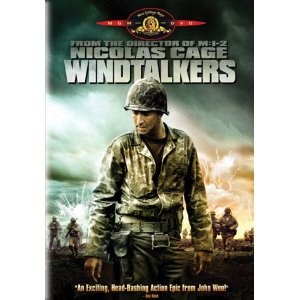 By Jae-Ha Kim
By Jae-Ha Kim
Chicago Sun-Times
June 11, 2002
Friendship isn’t the first word most people would think of to describe the World War II epic “Windtalkers,” which opens Friday. But it pops up frequently when the film’s stars Nicolas Cage and Adam Beach, and their director, John Woo, get together to discuss the movie.
“I knew very little about this part of history,” says Woo. “That is one reason why I wanted to make the film. It was important to me to show how important the Navajo Americans were to World War II. But I also wanted to show the camaraderie and friendship between the men–the respect that they gain for each other in a very difficult time.”
Cage, who worked with Woo in 1997’s “Face/Off,” adds, “I respond to that friendship between these men. John makes very human movies–stories that are about people and that’s one reason I wanted to do another film with him. Yes, this is a war movie, but it’s also about cultures coexisting together.”
He’s talking less about the adversarial relationship between the Americans and the Japanese than the way Americans regarded a different kind of American–the Navajos, who were enlisted to send and decipher encrypted military transmissions based on their native language.
According to Doris Paul’s The Navajo Code Talkers (Dorrance Publishing, $17), the code’s inception belongs to Los Angeles engineer Philip Johnston. But it was the 29 Navajo code talkers who developed the secret military code, which was never broken by the Japanese.
Cage is sitting in a suite at the Ritz-Carlton Hotel with Woo and Beach. While Beach happily eats a small bowl of soup and Woo politely oversees the interview with a quiet calm, Cage is at first diplomatic but reserved.
He knows what it’s like to be a heartthrob (“Valley Girl”), Oscar winner (“Leaving Las Vegas”) and an action hero (“Gone in Sixty Seconds”). He has been profiled in serious film journals. His picture has been splashed on the supermarket tabloids because of his relationships with Patricia Arquette and Lisa Marie Presley. Throw in a famous uncle (Francis Ford Coppola) and it’s not difficult to understand that he may be wondering if you’re going to concentrate on his filmwork or his private life.
“Your cousin [actor/musician] Jason [Schwartzman] cracks me up,” a reporter says, hoping to break the ice. “He told me during one phone interview he was sitting there half-naked. I didn’t ask which half. By the way, he calls you Nicky.”
“He’s great, isn’t he?” Cage says, smiling. “I’m still Nicky!”
The ice is broken. Beach looks up from his soup, laughs, and gives Cage a playful punch on the shoulder.
“I’d never have done that when I first met him,” says Beach, who plays Ben Yahzee, one of the Navajo code talkers. “I was pretty intimidated when I found out I’d got the part and that I would be working alongside Nicolas in a film by John Woo. I was afraid they’d rethink their hiring decision and fire me. But they were both so generous with everyone and shared their knowledge and love of filmmaking. They made it such a memorable experience for me.”
Yahzee is eager to fit in with his platoon. He realizes that even though his ancestors were in America first, he is the one viewed as an outsider. His ability to code talk makes him different from the rest of the platoon. But it also makes him necessary.
“I couldn’t repeat any of those codes now if I tried,” says Beach. “When we were filming, I had the rhythm down perfectly. But I will admit that when I had Nicolas in character screaming at me to hurry up and get it right, I got kind of nervous. I can’t imagine what it must be like to be under that kind of pressure when people’s lives depend on how much you’re paying attention.”
When Cage’s character, Joe Enders, is ordered to lead his men in the Battle of Saipan, he is told to keep his men safe, but to “protect the code at all costs.” That the code ultimately is more important to the military than the men who know what it stands for isn’t a shock, and Woo doesn’t spend time manipulating our heartstrings. War isn’t fair, and sacrifices are made. But how do you sacrifice a friend and live with your actions?
Woo doesn’t simplify Yahzee’s relationship with the others. He must be protected at all costs. To the other grunts, his life has more value than theirs. What they don’t realize is their superiors have orders to kill him and any other code talker rather than let them be captured by the enemy.
“The way John has put this all together, you don’t see an enemy really,” says Beach. “It’s kind of just following the struggle to survive by a group of men trying to get back home. Fighting is the only way to get that ending for them, whether they’re the Americans or the Japanese.”
Cage adds, “When you’re in a battle situation, you almost can’t look at the enemy as a person, because then you can’t do your job. At some point that kind of programming inevitably doesn’t work. I like to think we don’t paint anyone as the hero or villain in this film. Unfortunately, I think war will always exist. There’s always somebody wanting more.”
Woo made his name directing action films, but the action in “Windtalkers” is of a different kind than the stylized fights he stages in “Mission: Impossible 2.” We’re lulled into soaking in the gorgeous landscape before we’re hit with the one-two punch of machine guns and grenades. The scenes instill fear in the viewer. If we can’t tell where the enemy is, how are the Marines supposed to know?
“I wanted to show heaven and hell,” Woo says. “That’s how war can be.”